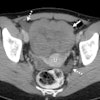
Research conducted under the auspices of an RSNA Research and Education Foundation grant has identified a new, noninvasive biomarker that could help monitor the treatment response of non-small cell lung cancer (NSCLC).
A team led by Dr. Everett Moding, PhD, of Stanford University found that midtreatment circulating tumor DNA (ctDNA) levels could help clinicians predict patients' progression-free survival and thus tailor chemoradiation treatment. Moding is a radiation oncologist.
"Our results provide important evidence that ctDNA analysis may be able to guide personalized therapeutic approaches in non-small cell lung cancer," Moding said in a report published May 21 by the RSNA. "We anticipate that our results, in combination with the growing evidence that ctDNA levels are prognostic in other solid cancers, will lead to prospective clinical trials to test whether personalization of radiation therapy and/or adjuvant therapy based on ctDNA levels has clinical utility."




















